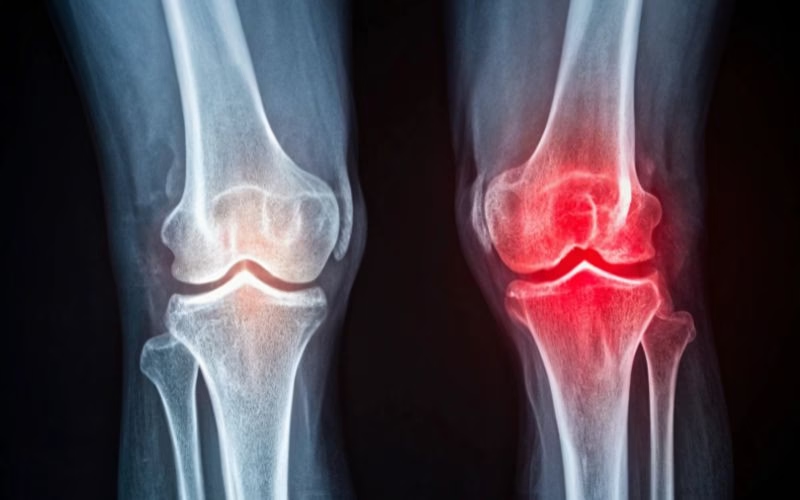Countering Inflammation: an Underlying Element in Many Major Health Conditions

Part 1: What Is Inflammation? (The Basics)
Inflammation often gets a bad rap, but in its simplest form, it’s a vital part of your body’s natural defense system. When you get a cut or twist an ankle, your body sends a flood of white blood cells to the area. This is acute inflammation—the redness, swelling, and pain are signs that your body is actively healing and protecting itself. It’s like a fire alarm going off to signal an emergency.
But what happens when the alarm never turns off?
Chronic inflammation is a low-grade, persistent state of alert. It’s not a response to an acute injury, but rather a slow-burning fire that can be triggered by lifestyle factors. Over time, this constant state of inflammation can put stress on your body and contribute to a variety of unwanted symptoms.
Part 2: The Hidden Culprit: Common Signs You May Be Experiencing Chronic Inflammation

Chronic inflammation is often subtle, and its symptoms can be easily dismissed as a normal part of getting older. Many people don’t realize that the discomfort they feel is actually a sign of an internal imbalance.
You may be experiencing chronic inflammation if you have:
- Persistent fatigue and low energy: Feeling drained even after a full night’s sleep can be a sign that your body is constantly fighting a battle behind the scenes.
- Joint pain or stiffness: Aches and a lack of mobility can be a physical manifestation of inflammation in and around your joints.
- Digestive issues: Consistent bloating, gas, or general gut discomfort may be your digestive system’s way of signaling an inflammatory response.
- Brain fog or difficulty concentrating: Your brain is highly sensitive to inflammation, and a foggy mind can be a direct result of it.
- Skin issues: Redness, rashes, or persistent skin irritation can be external signs of an internal inflammatory state.
Part 3: What’s Fueling the Fire?
Chronic inflammation is rarely caused by a single factor. It’s often the result of a combination of lifestyle choices. Clicking on the sections below can reveal how each one may be contributing to the fire.
Diet
The food you eat is either fueling your body or fueling inflammation. A diet high in processed foods, refined sugars, and unhealthy fats can lead to a state of chronic inflammation. These foods lack the vitamins, minerals, and antioxidants that your body needs to regulate its inflammatory response, and in some cases, can actively contribute to it.

Stress
Your mind and body are intrinsically linked. When you experience chronic stress, your body releases stress hormones like cortisol. While this is helpful in a fight-or-flight situation, a constant flood of these hormones can lead to a sustained inflammatory response throughout your body.
But even misguided attempts to “blow off steam” can result in increased inflammation in the body from late nights of partying and consuming alcoholic drinks or smoking.
Lack of Sleep
Sleep is your body’s essential repair mode. While you are sleeping, your body is busy mending and restoring itself, including regulating inflammatory pathways. When you don’t get enough high-quality sleep, you disrupt this crucial process, leaving your body in a state of imbalance.
Sedentary Lifestyle
An inactive lifestyle can contribute to chronic inflammation. Movement is key to healthy circulation, which helps to flush toxins and nourish tissues. Regular, low-impact exercise can help to reduce inflammatory markers in the body and keep your systems running smoothly.
Part 4: Your Path to Balance: A Holistic Approach

The good news is that you have the power to put out the fire. By making intelligent, holistic changes, you can support your body’s natural ability to restore balance.
- Eat Anti-Inflammatory Foods: Embrace a colorful diet rich in leafy greens, berries, fatty fish (like salmon and tuna), nuts, seeds, and vibrant spices. These foods are packed with antioxidants and healthy fats that help your body’s natural processes.
- Manage Stress: Find a stress-management practice that works for you. This could be as simple as taking 10 minutes for deep breathing, practicing meditation, or spending time in nature.
- Move Your Body: Incorporate regular, low-impact exercise into your routine. Walking, yoga, swimming, and cycling are all great ways to support joint health and help keep inflammation in check.
Part 5: The Role of Targeted Nutritional Support
While a healthy lifestyle is the foundation, sometimes our bodies need a little extra support. This is where a targeted nutritional approach can play a powerful role. By providing your body with the key nutrients it needs, you can support its natural ability to manage inflammation.
- Turmeric and its active compound, Curcumin, are celebrated for their ability to support a healthy inflammatory response.
- Type II Collagen peptides are not only the basic building blocks of cartilage, but this specialized joint collagen has an anti-inflammatory effect too.
- Boswellia Serrata is a powerful botanical that has been traditionally used to help modulate inflammatory pathways.
- Ginger Root also offers natural digestive support and helps promote a healthy inflammatory response.
These are not “cures” for inflammation, but they are powerful tools that can be part of a larger, more focused approach to managing the symptoms. This thought encompasses the comprehensive joint formula found in Smartilage as well.
By providing your body with these targeted nutrients, you are actively helping to turn down the volume on the “silent fire,” so you can live with greater comfort and vitality.